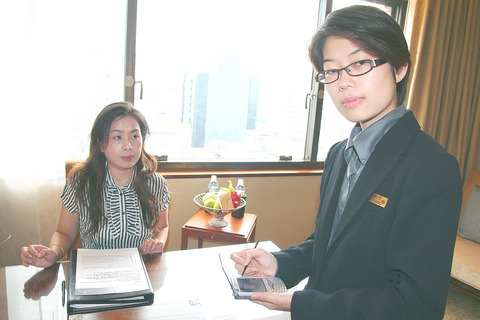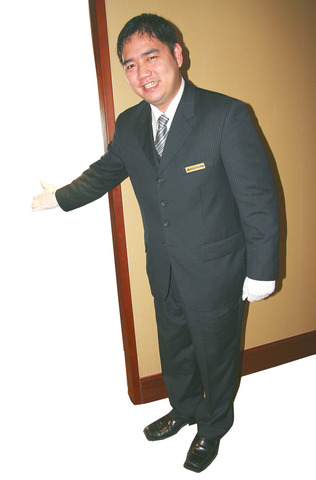Monty the butler looks the part as he motions to enter the room, with his dark suit, burnished shoes and white gloves. But apart from the solicitous attitude he's nothing like the cynical valet Jeeves or Batman's haughty manservant Alfred Pennyworth.
He has prepared a bowl of your favorite fruits and because it's teatime there are also cakes and biscuits. He shows you around the suite, unpacks your bag and enquires if you would like a lavender and lemon tree oil scented bath before dinner. He synchronizes his watch with yours and offers his mobile number, so you can call him any time, day or night.
He then goes through his routine of establishing what you want and when you want it, ending with the words, “Is there anything else, sir?”

PHOTOS: JULES QUARTLY, TAIPEI TIMES
“Yeah, do you like your job?”
“I like it with a passion,” he answers emphatically, then beams his megawatt smile and closes the door quietly behind him.
While servants and masters have been out of fashion for about a hundred years the butler has recently made a comeback. But he is more likely to be found in an international hotel than on an English country estate. And he is just as likely to be a she.

At the Sheraton Taipei, 10 of the 20 full-time butlers who this month started servicing its three executive floors are women, partly because some of its well-off clients are Japanese ladies who may be put out by a man in their room.
“You have to understand Asian culture and what is comfortable for our guests,” says Sheraton Taipei general manager Josef Dolp, who lists Rain, Japan's top sumo wrestlers, Jet Li (李連杰) and captains of industry among his clients. “Many business women, wherever they're from, will feel more at ease with a female, since they more easily understand their needs.”
“When we were planning to introduce this service I was surprised at how many women wanted to be a butler. But it's a service culture we have here and of course women are often more sensitive to people's needs, so it's a natural progression.”
Wei Zhang (張梧雨) is the head butler at the hotel and talks about “creating a different image” and “intelligent service.” She says the focus of her job is not so much making guests feel special as “enabling them to conduct business,” adding there can be an “embarrassment factor” for those who are not used to the level of service she provides. Knowing when to leave a guest alone, she says, is most important.
“I'm a young professional and I take this job very seriously,” she says. “Obviously communication skills are most important, that and having an eye for detail. If I notice the small things and do something about them the guest will appreciate it.”
She keeps a surreptitious eye on what guests eat so she can offer restaurant suggestions; and takes notes on the preferred climate control settings of the room so it's always the right temperature. If her guest smokes she will remember the make of cigarette and when the packet is nearly finished, set another carton next to it. She helps buy gifts for the businessperson's family, thus saving time. “If I do these things then I will wow the guest. The wow factor is what I work for,” Zhang says.
It's a long way from the traditional concept of the butler, as described by Bertie Wooster in P.G. Wodehouse's Jeeves novels:
“As I stood in my lonely bedroom at the hotel, trying to tie my white tie myself, it struck me for the first time that there must be whole squads of chappies in the world who had to get along without a man to look after them.”
Historically, the Bible mentions Egypt's pharaohs had butlers. They were in charge of the cellar in medieval Europe — the word comes from the French bouteillier, who looked after bottles of wine. In the 17th and 18th centuries butlers gradually came to prominence and in the mid-19th century became heads of households on country estates and in town houses. After World War I, as social conditions changed, they started dying out along with the British aristocracy.
More recently, in the US and elsewhere, butlers have become glorified household managers and personal assistants, dealing with domestic expenses, as well as arranging meetings and dropping off the children at school. They can earn from US$50,000 to US$400,000, according to the International Guild of Professional Butlers, which estimates there are around 50,000 professional butlers plying their trade around the world.
This figure is growing, however, as top-end hotels compete for business. The Sheraton, for instance, recently finished two years of renovations costing US$75 million and now has the same class of facilities as the most upscale hotels. It intends to up its rating further by offering superior service and this is epitomized by the butler. Since lords and ladies are a dying breed, the well-heeled businessperson is now king, or queen.
To keep them happy the Sheraton approached the UK-based Guild of Professional English Butlers when it set up its service. The director of training, Anthony Seddon-Holland, then came over to lay down the laws of outstanding service.
Butlers learn “great service is easier to give than bad service” and every time there is an interaction “the guest decides whether they pass or fail that moment,” according to the guild's Web site. Guests, it adds, “do not always ask the right question, but expect staff to give the right answer.” Attention to “detail is the difference between getting it right and getting it wrong.” The main point, is to be proactive and offer the guest what he or she wants before they even know they need it.
Monty is from the Philippines and an example of how butling has become a 21st-century profession. Born Belgera Monithor, he holds a bachelor degree in tourism. He became a head butler after stints at a golf and country club and resort hotel in the Philippines, looking after distinguished guests such as the former US ambassador. He was recruited by the Sheraton to provide experience and expertise as it institutes its butler service.
“There has been an evolution. Hoteliers have adjusted the butler tradition to incorporate the needs of guests, especially businessmen and tourists,” Monty says, adding his job has one important similarity to “the old days,” in that trust is imperative and he would “never divulge a secret or confidence.”
“The modern butler is a combination of tradition and the needs of the present, such as organizing meetings and interviews. Modern-day people still like the idea of the butler because he represents the best in service, but his role has been adapted and that is where I enter the picture, as the hotel butler.”
“Serving people is no easy task. You have to anticipate your guest's needs, it's like reading minds. A lot of my former colleagues couldn't take the pressure: the long working hours, guest complaints and high expectations. But I overcame these difficulties. I treat my guests equally, their status is the same regardless of gender, race or income,” Monty says.
He sees his career path as becoming an estate manager to someone immensely rich, or becoming the general manager of a hotel. “Since a butler is exposed to all elements of the hotel's operation and really understands how it works, especially service, he could do the job very well.”
So, is the modern-day butler loyal to his boss or his guest?
“Ooh, that's a difficult question, sir,” Monty says, then answers diplomatically, “The challenge is to keep everyone happy. In the old days the loyalty of a butler was to his master. Lords and ladies were used to service and when they traveled they took their butler with them. Today, the point is to be a service professional: a lifestyle manager.”

April 28 to May 4 During the Japanese colonial era, a city’s “first” high school typically served Japanese students, while Taiwanese attended the “second” high school. Only in Taichung was this reversed. That’s because when Taichung First High School opened its doors on May 1, 1915 to serve Taiwanese students who were previously barred from secondary education, it was the only high school in town. Former principal Hideo Azukisawa threatened to quit when the government in 1922 attempted to transfer the “first” designation to a new local high school for Japanese students, leading to this unusual situation. Prior to the Taichung First

Chinese Nationalist Party (KMT) Chairman Eric Chu (朱立倫) hatched a bold plan to charge forward and seize the initiative when he held a protest in front of the Taipei City Prosecutors’ Office. Though risky, because illegal, its success would help tackle at least six problems facing both himself and the KMT. What he did not see coming was Taipei Mayor Chiang Wan-an (將萬安) tripping him up out of the gate. In spite of Chu being the most consequential and successful KMT chairman since the early 2010s — arguably saving the party from financial ruin and restoring its electoral viability —

The Ministry of Education last month proposed a nationwide ban on mobile devices in schools, aiming to curb concerns over student phone addiction. Under the revised regulation, which will take effect in August, teachers and schools will be required to collect mobile devices — including phones, laptops and wearables devices — for safekeeping during school hours, unless they are being used for educational purposes. For Chang Fong-ching (張鳳琴), the ban will have a positive impact. “It’s a good move,” says the professor in the department of

Toward the outside edge of Taichung City, in Wufeng District (霧峰去), sits a sprawling collection of single-story buildings with tiled roofs belonging to the Wufeng Lin (霧峰林家) family, who rose to prominence through success in military, commercial, and artistic endeavors in the 19th century. Most of these buildings have brick walls and tiled roofs in the traditional reddish-brown color, but in the middle is one incongruous property with bright white walls and a black tiled roof: Yipu Garden (頤圃). Purists may scoff at the Japanese-style exterior and its radical departure from the Fujianese architectural style of the surrounding buildings. However, the property